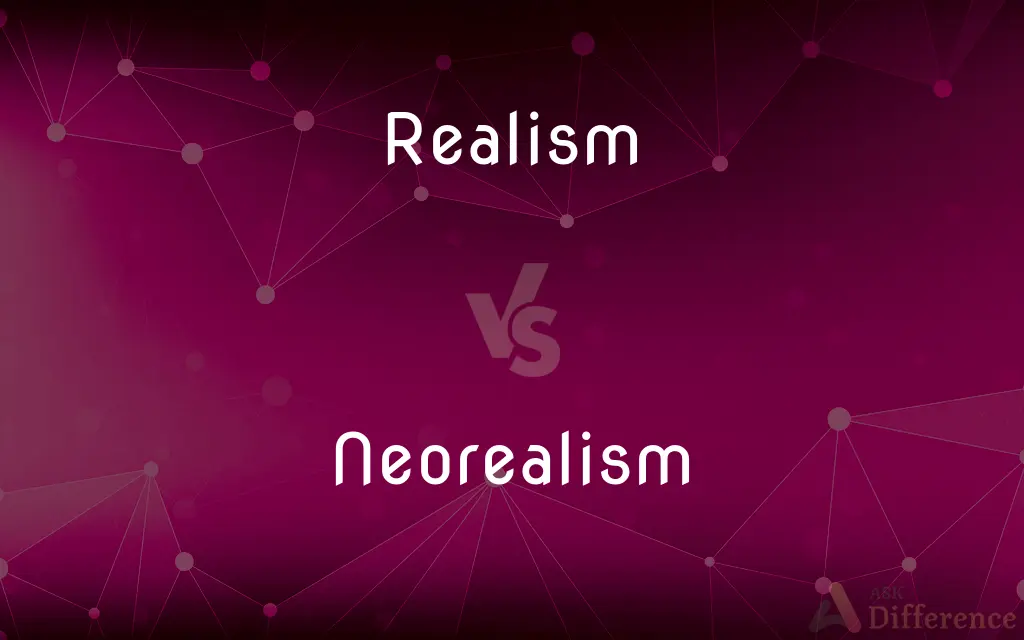Realism vs. Neorealism — What's the Difference?
By Maham Liaqat & Urooj Arif — Updated on April 18, 2024
Realism focuses on states as the primary actors in an anarchic international system seeking power, while Neorealism emphasizes the structure of the international system itself as the determinant of state behavior.

Difference Between Realism and Neorealism
Table of Contents
ADVERTISEMENT
Key Differences
Realism, rooted in the tradition of political philosophy, posits that states act primarily out of self-interest to accumulate power and ensure their survival. This theory highlights the inherent selfishness and competitive nature of states in an international system lacking overarching authority. Neorealism, or structural realism, while retaining the emphasis on state survival, attributes state behavior more to the anarchic structure of the international system than to human nature or ethical considerations.
Realism assumes that all states possess some offensive military capability, which they might use if it serves their interests, leading to a general distrust among states. Neorealism, on the other hand, focuses on the distribution of power in the international system. It argues that the structure of the international system compels states to act in certain ways, regardless of their individual characteristics or intentions.
In Realism, power is often viewed in tangible terms such as military strength and economic resources. Neorealism expands this concept by considering the balance of power and strategic positioning within the international system, suggesting that it is not only raw power but also the relative capabilities that determine state behavior.
Realism does not heavily focus on predicting the behavior of states but rather explains it through historical examples. Neorealism seeks to provide a more scientific and predictive framework by focusing on recurring patterns and structures that dictate state interactions, thus aiming for broader applicability across different historical and geographic contexts.
Realism often discusses the role of great powers in maintaining international order, suggesting that they have both the capability and the incentive to enforce stability. Neorealism, while also recognizing the importance of great powers, stresses how their actions are constrained and shaped by the international system, leading to patterns such as balancing against threats or bandwagoning with rising powers.
ADVERTISEMENT
Comparison Chart
Focus
Power and survival of individual states
Structure of the international system
Key Actors
States
States influenced by international structure
View on Power
Tangible military and economic strength
Balance of power and relative capabilities
Predictive Capability
Limited, more interpretative
Higher, aims for scientific predictions
Interpretation of State Behavior
Based on individual state decisions
Determined by systemic structure
Compare with Definitions
Realism
A theory in international relations focusing on competition for power among states.
Realism explains the Cold War as a power struggle between the US and the USSR.
Neorealism
Sees the international system as characterized by anarchy but governed by predictable patterns.
Neorealism predicts that states will either balance against or bandwagon with the leading power.
Realism
Emphasizes the anarchic nature of the international system and the self-help mechanisms states must employ.
In realism, the lack of a global government forces states to rely primarily on themselves for security.
Neorealism
Argues that the distribution of power across states dictates international relations dynamics.
Neorealism explains shifts in alliances as responses to changes in the power distribution.
Realism
Views states as rational actors making strategic decisions to ensure survival.
Realism would interpret the arms race as a rational response to security threats.
Neorealism
A branch of realism that emphasizes the influence of the international system's structure on state behavior.
Neorealism would analyze the U.S.-China rivalry as driven by structural tensions in the international system.
Realism
Considers moral arguments less relevant in the conduct of international politics.
Realism often dismisses ethical concerns in favor of national interest.
Neorealism
Believes state behavior is constrained by the international structure, limiting their freedom of action.
Neorealism suggests small states are often forced into decisions not solely of their own making due to systemic pressures.
Realism
Asserts that great powers play a pivotal role in maintaining international order.
According to realism, the U.S.'s military dominance helps prevent major global conflicts.
Neorealism
Focuses on strategic interactions and positions rather than individual state characteristics.
Neorealism would view the formation of the European Union as a strategic positioning rather than a cultural or historical convergence.
Realism
An inclination toward literal truth and pragmatism.
Neorealism
(arts) A movement in art, literature and (especially in Italy) cinema, shortly after the Second World War, that concentrated on real life.
Realism
The representation in art or literature of objects, actions, or social conditions as they actually are, without idealization or presentation in abstract form.
Neorealism
(political science) A theory of international relations based on the idea that power is the most important factor.
Realism
The scholastic doctrine, opposed to nominalism, that universals exist independently of their being thought.
Realism
The modern philosophical doctrine, opposed to idealism, that objects exist independently of their being perceived.
Realism
A concern for fact or reality and rejection of the impractical and visionary.
Realism
An artistic representation of reality as it is.
Realism
(sciences) The viewpoint that an external reality exists independent of observation.
Realism
(philosophy) A doctrine that universals are real—they exist and are distinct from the particulars that instantiate them.
Realism
As opposed to nominalism, the doctrine that genera and species are real things or entities, existing independently of our conceptions. According to realism the Universal exists ante rem (Plato), or in re (Aristotle).
Realism
Fidelity to nature or to real life; representation without idealization, and making no appeal to the imagination; adherence to the actual fact.
Realism
The practise of assessing facts and the probabilities of the consequences of actions in an objective manner; avoidance of unrealistic or impractical beliefs or efforts. Contrasted to idealism, self-deception, overoptimism, overimaginativeness, or visionariness.
Realism
The attribute of accepting the facts of life and favoring practicality and literal truth
Realism
(philosophy) the philosophical doctrine that physical object continue to exist when not perceived
Realism
The state of being actual or real;
The reality of his situation slowly dawned on him
Realism
An artistic movement in 19th century France; artists and writers strove for detailed realistic and factual description
Realism
(philosophy) the philosophical doctrine that abstract concepts exist independent of their names
Common Curiosities
How do Realism and Neorealism differ in their approach to great powers?
Realism sees great powers as maintaining order based on their capabilities and interests, while Neorealism considers their actions more constrained by the international system's structure.
Can Neorealism predict international outcomes better than Realism?
Neorealism aims to offer more scientific and predictive insights based on the analysis of structural patterns, potentially providing better predictability than Realism.
How do Realism and Neorealism view power?
Realism views power in terms of military and economic might, whereas Neorealism considers the distribution and balance of power within the international system.
Which theory offers a better explanation for the rise of new powers?
Realism focuses on the actions and strategies of rising powers themselves, while Neorealism looks at how the existing power structure and system dynamics facilitate or hinder the rise of new powers.
Do Realism and Neorealism agree on the role of ethics in international politics?
Both theories generally deemphasize ethical considerations, focusing instead on power and survival from a pragmatic standpoint.
How do Realism and Neorealism interpret alliances?
Realism views alliances as tactical arrangements made for balancing against threats. Neorealism sees them as influenced by the broader structure and balance of power, often driven by systemic needs rather than mere tactical choices.
Can either theory explain peace periods in international relations?
Realism might attribute peace to a balance of power and deterrence, while Neorealism could argue that systemic stability and predictable power structures underpin periods of peace.
Which theory is more focused on the impact of non-state actors?
Generally, both theories primarily focus on state actors, but Neorealism is slightly more adaptable to considering the roles of non-state actors due to its emphasis on systemic factors.
How do Realism and Neorealism differ in understanding economic sanctions?
Realism sees economic sanctions as tools for power and coercion by states. Neorealism might analyze sanctions as part of broader strategic interactions influenced by the international system's dynamics.
How do the theories view technological advancements in warfare?
Realism might consider technological advancements as tools that increase a state's power. Neorealism would analyze how these technologies affect the overall balance of power and strategic stability within the system.
What is the main difference between Realism and Neorealism?
Realism focuses on state behavior driven by the desire for power and survival, while Neorealism emphasizes the international system's structure as the primary influence on state behavior.
What are the implications of Realism and Neorealism for international cooperation?
Realism is skeptical of long-term international cooperation due to trust issues and competition, whereas Neorealism believes cooperation can occur as a strategic necessity dictated by the system's architecture.
What type of international behavior do Realism and Neorealism predict during crises?
Realism predicts that states will act in their self-interest to maximize security and power. Neorealism suggests states respond based on their position within the international power structure and external pressures.
Do Realism and Neorealism offer different views on nuclear proliferation?
Realism may view nuclear proliferation as a natural outcome of state-led security maximization. Neorealism would examine how the system's structure and power distribution influence proliferation decisions.
What is the role of ideology according to Realism and Neorealism?
Realism may consider ideology as a factor in state behavior but secondary to the pursuit of power. Neorealism generally views ideological alignments as outcomes influenced by the system's structure rather than primary motivators.
Share Your Discovery

Previous Comparison
Withdraw vs. Cancellation
Next Comparison
Creat vs. CreateAuthor Spotlight
Written by
Maham LiaqatCo-written by
Urooj ArifUrooj is a skilled content writer at Ask Difference, known for her exceptional ability to simplify complex topics into engaging and informative content. With a passion for research and a flair for clear, concise writing, she consistently delivers articles that resonate with our diverse audience.
















































